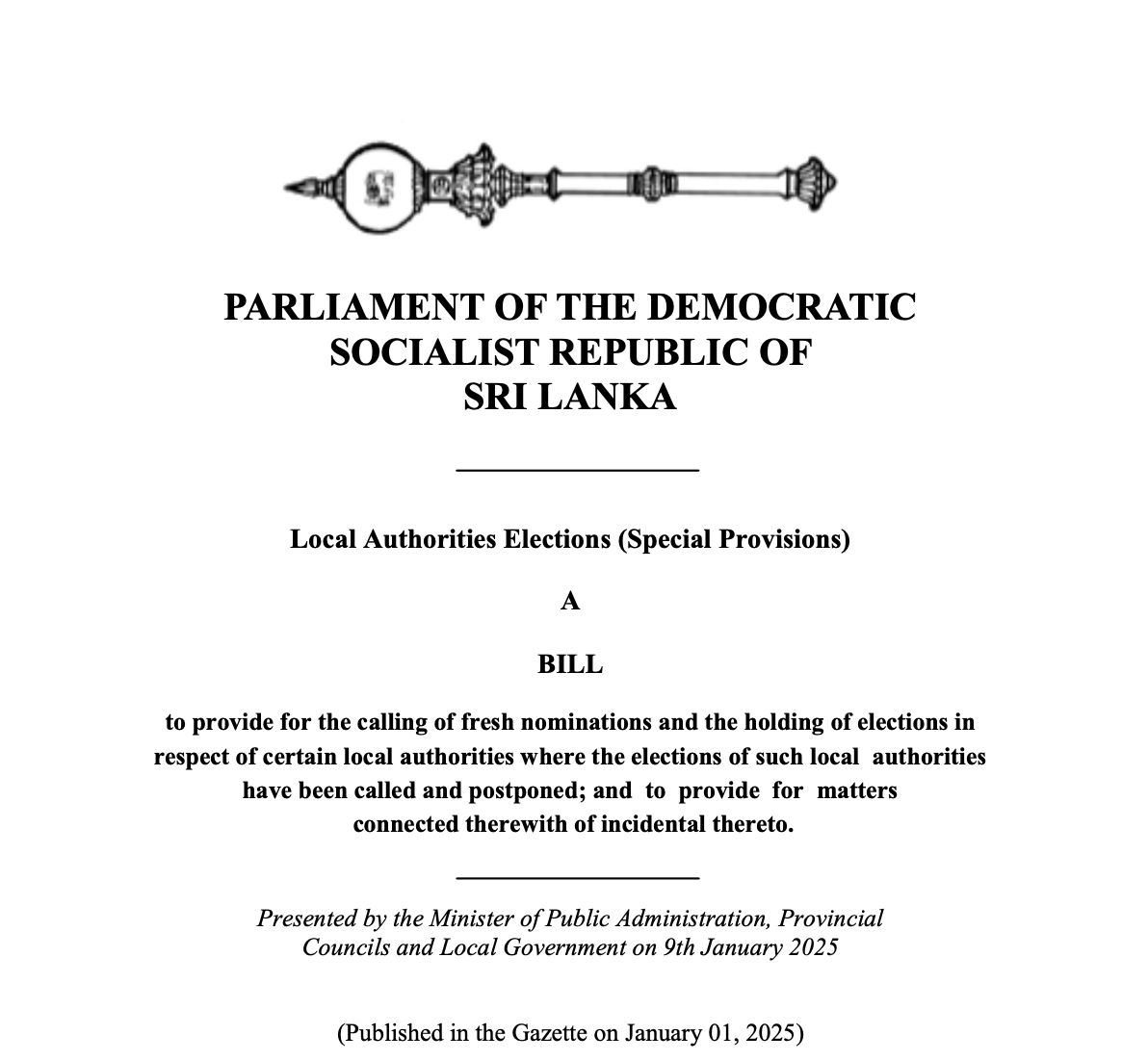Introduction The “Local Authorities Elections (Special Provisions) Bill” was introduced in the Parliament of the Democratic Socialist Republic of Sri Lanka on January 9, 2025. The primary purpose of this bill is to address procedural and administrative gaps arising from the postponement of local authority elections initially scheduled for March 9, 2023. It establishes provisions for conducting fresh elections and ensures the inclusion of new voters and youth representation.
Salient Features of the Bill
- Objective of the Legislation
- The bill provides a legal framework for rescheduling elections for specific local authorities.
- It addresses issues related to nominations submitted before the postponement and ensures the inclusion of new voters who registered after the original nomination process.
- Revocation of Previous Nominations and Deposits
- Nomination papers submitted for the postponed elections are rendered null and void.
- Deposits made under the initial nomination process will be refunded upon the production of valid receipts.
- Fresh Nomination Process
- The Elections Commission is mandated to issue fresh notices for nominations under Section 26 of the Local Authorities Elections Ordinance.
- New nominations must be published in the Gazette within three months of the act’s implementation.
- Inclusion of New Voters
- The bill explicitly includes provisions for individuals registered in the electoral register of 2024, thereby ensuring their participation in the upcoming elections.
- Youth Representation
- Provisions under the Local Authority Elections Ordinance (Chapter 262) concerning youth candidates are reinforced, mandating their inclusion in the nomination process.
- Sinhala Text Prevails
- In case of inconsistencies between the Sinhala and Tamil texts of the legislation, the Sinhala version shall prevail.
Geographic Scope and Applicability The bill’s provisions apply to specific local authorities across various districts of Sri Lanka. A detailed schedule lists the affected local authorities, categorized by districts such as Colombo, Gampaha, Kalutara, Kandy, and others. These include municipal councils, urban councils, and Pradeshiya Sabhas.
Key Implementation Guidelines
- Timeline for Election Steps: The Elections Commission is required to commence the election process within three months of the act’s enactment. This includes issuing fresh nomination notices and ensuring compliance with revised procedures.
- Refund Mechanism: Candidates from political parties or independent groups can reclaim deposits made under the initial nomination process by presenting the original receipts.
Significance of the Bill
- Democratic Participation:
- The bill ensures that all eligible voters, including those who registered after the initial election schedule, can exercise their democratic rights.
- It emphasizes youth inclusion, promoting broader representation in governance.
- Administrative Clarity:
- By annulling previous nominations and deposits, the bill eliminates legal ambiguities stemming from the postponed elections.
- It provides a structured and clear timeline for resuming the electoral process.
- Transparency and Inclusivity:
- The provision for refunding deposits promotes financial accountability.
- The act’s explicit focus on youth candidates highlights the government’s commitment to inclusive governance.
Challenges and Considerations
- Timely Implementation: Ensuring that the Elections Commission adheres to the three-month deadline will require robust administrative coordination.
- Public Awareness: Informing affected voters and candidates about the new procedures is critical to avoid confusion.
- Resource Allocation: Conducting fresh elections across numerous local authorities will necessitate significant financial and logistical resources.
Conclusion The Local Authorities Elections (Special Provisions) Bill is a crucial step in addressing the procedural challenges arising from postponed local elections. By emphasizing inclusivity, transparency, and administrative efficiency, it aims to strengthen the democratic process in Sri Lanka. However, its success depends on effective implementation, timely communication with stakeholders, and the commitment of relevant authorities to uphold the stipulated timelines and provisions.














